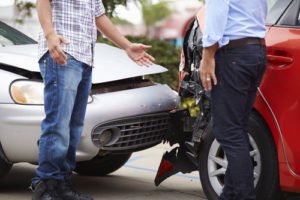
Yes. Under California Vehicle Code 16025, you must share and exchange insurance information after an auto accident. The only exception is when you are rendered incapable of doing so because of the accident.
In addition, VC 16025 requires you to share the following information:
- your name and current address,
- your driver’s license number,
- your car’s vehicle identification number, and
- the address of the owner of the vehicle.
The language of the code section reads as follows:
16025. (a) Every driver involved in the accident shall, unless rendered incapable, exchange with any other driver or property owner involved in the accident and present at the scene, all of the following information:
(1) Driver’s name and current residence address, driver’s license number, vehicle identification number, and current residence address of registered owner.
(2) Evidence of financial responsibility, as specified in Section 16020. If the financial responsibility of a person is a form of insurance, then that person shall supply the name and address of the insurance company and the number of the insurance policy.
(b) Any person failing to comply with all of the requirements of this section is guilty of an infraction punishable by a fine not to exceed two hundred fifty dollars ($250).
A person who does not comply with the above will be guilty of an infraction that is punishable by a maximum fine of $250. Note that court fees will be added to this fine; and therefore, a driver may ultimately owe close to $1,000.
What is required under Vehicle Code 16025?
VC 16025 states that, following a motor vehicle accident, the drivers involved must share evidence of their “financial responsibility” with one another.
According to California Vehicle Code 16020 VC, evidence of “financial responsibility” includes the following:
- a driver’s insurance card,
- a certificate of self-insurance (if the car owner is self-insured), or
- a showing that the United States or a public entity owns or leases a driver’s vehicle.
If evidence of financial responsibility is proven via an insurance card, you must exchange the name and address of your insurance company and the number of your insurance policy.
The rule requiring a driver to share insurance information does not apply to any driver who is:
- incapable of exchanging the information,
- because of the accident.
What happens for a violation of Vehicle Code 16025?
Two things happen if you do not comply with VC 16025. These are:
- you can be charged with an infraction; and,
- you can be ordered to pay a maximum fine of $250 (plus court costs).
Please note that court fees will ultimately get added to any fine assessed. This means that if you VC 16025, you could face a final monetary penalty of close to $1,000. That said, no points are assessed to your DMV driving record.
Finally, you must not ignore a California ticket for not exchanging insurance information. If you do, you risk getting charged with failure to appear, per California Vehicle Code 40508. Failure to appear, under California law, may be charged as a misdemeanor.

